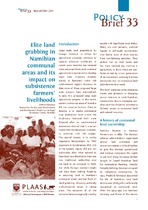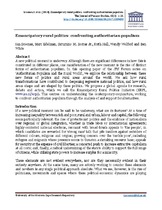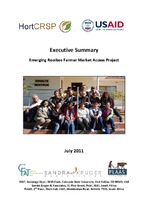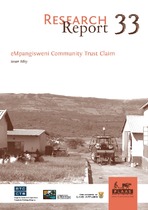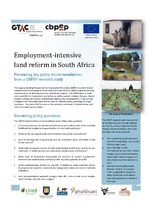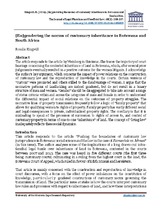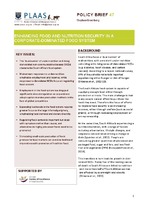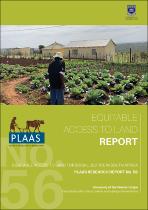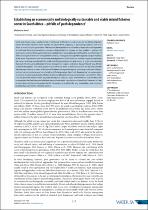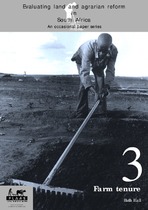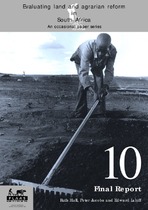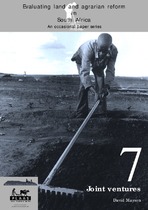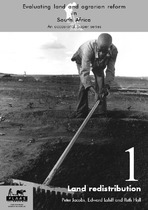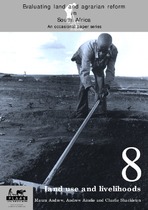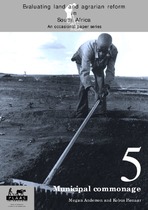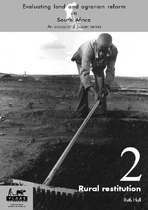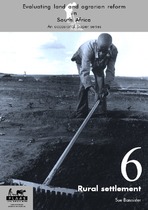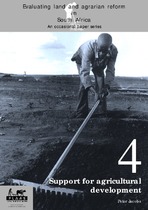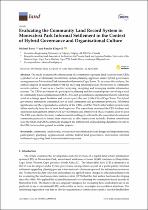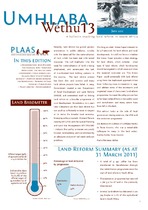Browsing Institute for Poverty, Land and Agrarian Studies (PLAAS) by Title
Now showing items 170-189 of 608
-
Elite land grabbing in Namibian communal areas and its impact on subsistence farmers’ livelihoods
(Institute for Poverty, Land and Agrarian Studies, University of the Western Cape, 2011)Large scale land acquisitions by foreign investors in Africa for agricultural purposes continue to capture attention worldwide. In recent years Namibia has received some proposals from multi-national agricultural ... -
Emancipatory rural politics: confronting authoritarian populism
(Taylor & Francis, 2016)A new political moment is underway. Although there are significant differences in how this is constituted in different places, one manifestation of the new moment is the rise of distinct forms of authoritarian populism. ... -
Emerging rooibos farmer market access project
(Institute for Poverty, Land and Agrarian Studies, University of the Western Cape, 2011)Global markets increasingly require rapid and coordinated response to standards and certification. Yet despite broad political transformations in post‐Apartheid South Africa, structural power relations limit emerging farmer ... -
eMpangisweni community trust claim
(Institute for Poverty, Land and Agrarian Studies, University of the Western Cape, 2007)This diagnostic study examines the case of the restoration of ten farms in KwaZulu-Natal, in the area of abaQulusi Local Municipality and Zululand District Municipality, to the eMpangisweni Community Trust in 2003. The ... -
Employment-intensive land reform in South Africa
(GTAC, 2020)The Capacity Building Programme for Employment Promotion (CBPEP) is an EU-funded initiative aimed at assisting the Government of South Africa to attain its goal of reducing unemployment, by building state and institutional ... -
[En]gendering the norms of customary inheritance in Botswana and South Africa
(Taylor & Francis, 2016)The article responds to the article by Weinberg in this issue. She traces the trajectory of court hearings concerning the contested inheritance of land in Botswana, which, after several prior judgements eventually resulted ... -
Enhancing food and nutrition security in a corporate-dominated food system
(Institute for Poverty, Land and Agrarian Studies, University of the Western Cape, 2017)South Africa faces a ‘dual burden’ of malnutrition, with persistent under-nutrition coinciding with rising rates of diet-related NCDs (e.g. diabetes, heart disease, and certain cancers). According to a recent national ... -
Equitable access to land for social justice in South Africa
(Institute for Poverty Land and Agrarian Studies (PLAAS), 2021-11)This report analyses the trajectory of land reform in South Africa and its implications for equitable access to land. The report combines insights from empirical research and inclusive dialogues to analyse the extent to ... -
Establishing an economically and biologically sustainable and viable inland fisheries sector in South Africa – pitfalls of path dependence
(Water Research Commission, 2022)Small-scale fisheries play a significant role in livelihoods and food and nutrition security for millions of people around the world. However, these benefits are under threat, especially in developing countries such as ... -
Evaluating land and agrarian reform in South Africa : Farm tenure
(Institute for Poverty Land and Agrarian Studies (PLAAS), 2003)Farm dwellers are among the poorest South Africans. Most have access to residential land only. A minority has access to grazing land for their livestock or to arable land for cultivation, in return for which they may be ... -
Evaluating land and agrarian reform in South Africa : Final Report
(Institute for Poverty Land and Agrarian Studies (PLAAS), 2003)Land dispossession was a key feature of racism under colonial rule and apartheid in South Africa. More than 3.5 million people were forcibly removed in the period 1960 to 1983 alone, through homeland consolidation, removals ... -
Evaluating land and agrarian reform in South Africa : Joint ventures
(Institute for Poverty Land and Agrarian Studies (PLAAS), 2003)Joint ventures (JVs) are an increasingly common feature of the process of land and agrarian reform in South Africa. They involve black people who currently have land rights or who are land reform beneficiaries and will be ... -
Evaluating land and agrarian reform in South Africa : Land redistribution
(Institute for Poverty Land and Agrarian Studies (PLAAS), 2003)Land dispossession during the colonial era and the decades of apartheid rule produced a highly unequal pattern of land ownership and widespread rural poverty in South Africa. When a democratically elected government came ... -
Evaluating land and agrarian reform in South Africa : Land use and livelihoods
(Institute for Poverty Land and Agrarian Studies (PLAAS), 2003)This paper addresses how land reform can contribute to enhancing land-based livelihoods. South African agriculture is often characterised as being divided into two types: freehold tenure/ commercial agriculture vs. ... -
Evaluating land and agrarian reform in South Africa : Municipal commonage
(Institute for Poverty Land and Agrarian Studies (PLAAS), 2003)This paper compares the performance of the Municipal Commonage Programme of the Department of Land Affairs (DLA) with the objectives stated in the White Paper on South African Land Policy (DLA 1997). This paper will review ... -
Evaluating land and agrarian reform in South Africa : Rural restitution
(Institute for Poverty Land and Agrarian Studies (PLAAS), 2003)During the negotiated transition to democracy, many South Africans expected that liberation would bring the return of land they had been dispossessed of under colonialism and apartheid, but the terms on which the transition ... -
Evaluating land and agrarian reform in South Africa : Rural settlement
(Institute for Poverty Land and Agrarian Studies (PLAAS), 2003)The primary focus of South Africa is land reform programme is the acquisition of land and tenure security. The policies and strategies attached to this programme have provided many people with land. However, access to land ... -
Evaluating land and agrarian reform in South Africa : Support for agricultural development
(Institute for Poverty Land and Agrarian Studies (PLAAS), 2003)In South Africa, land reform has to be more than securing land rights and transferring a certain number of hectares to black people. Broadly speaking, it has to take into account the uneven spatial development patterns ... -
Evaluating the community land record system in Monwabisi park informal settlement in the context of hybrid governance and organisational culture
(MPDI, 2020)The study examined the effectiveness of a community-operated land record system (CRS), a product of an evolutionary information system planning approach under hybrid governance arrangements in Monwabisi Park informal ... -
Evictions from farms – the role of local government
(PLAAS, 2011-06)Recently, land reform has gained greater prominence in public debates, notably with the latest call for the nationalisation of land, which has been met with mixed responses. The call highlights why the need for nationalisation ...

